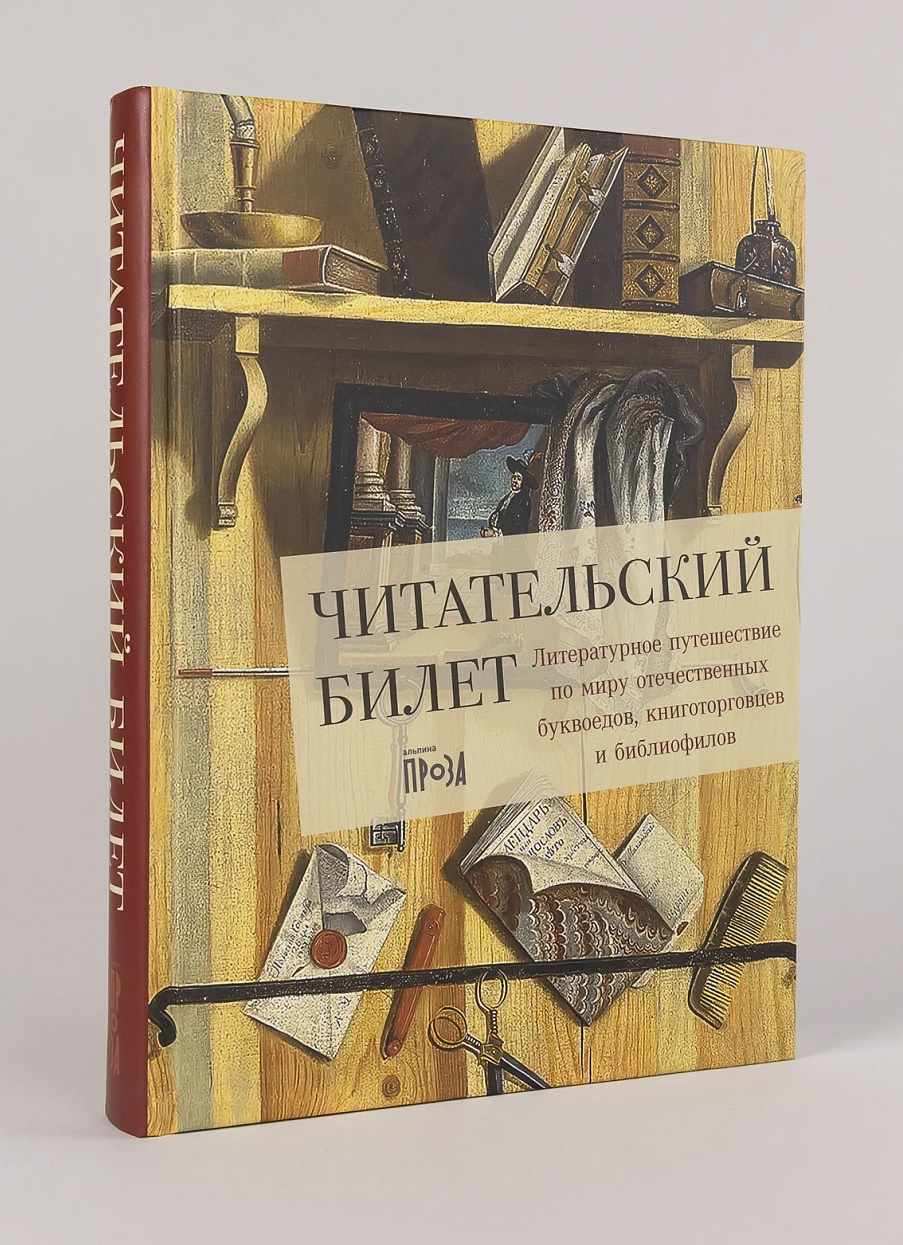The Book is in the Air: Bibliophiles and Bibliophobes in Russian Literature

The heroine of this anthology is the book - even the Book with a capital letter, for it often appears on these pages as an animated being. Critic Lidia Maslova presents the book of the week, especially for Izvestia.
Yulia Shcherbinina
"Reader's Ticket: A Literary Journey through the world of Russian booksellers, booksellers and bibliophiles."
М. : Alpina non-fiction, 2025. - 460 с.
As an epigraph Julia Shcherbinina chose lines from Dmitry Stakheev's 1890 story "The Desert Dweller": "...If we imagine books revitalized and listen to what they talk about one to another, how much interesting things we could learn, and not only about the lives of their owners, but also about their own wanderings from one bookcase to another". The secret life of books, quietly discussing among themselves people - quite common, wandering through world literature plot, but not the only one of those that managed to cover Shcherbinina, collected the most different genre and tone of works that can "entertain, warm and comfort the book lover.
However, the speech in "Reader's Ticket" will go not only about bibliophilia, but also about bibliophobia. The anthology includes two works with the title "Scary Book". Boris Panteleimonov's story of 1948 is placed in the first part "We read by sucking, from the board to the board...", which has the subtitle "Life Stories". In the mocking Panteleimonov young rich merchant dies from fear of poverty, too keen on reading the old wise book "On Poverty and Wealth", in which "every word stabs into the heart."

Among other worldly stories here can be found Maxim Gorky's cautionary tale "The Case with the Clasps" about three bums who stole from an old woman, to whom they were hired to moonlight, silver clasps from a luxuriously bound Bible, but then experienced something like a moral rebirth. Ivan Goncharov describes his new servant Valentine's infatuation with Zhukovsky's poetry (in the 1888 short story of the same name) in a highly ironic way, which Valentine does not understand at all, but which is even more irresistible, and condescendingly concludes: "...a simple Russian man does not always like to understand what he reads. I have seen ordinary people read to tears holy books in the Slavonic language, understanding nothing or understanding only "other words", as my Valentine did. I remember how sailors on a ship listened to such a book, not moving for hours, looking into the mouth of the reader, only if he read loudly and with feeling. Simple people do not like simplicity.
The second in the anthology "Scary Book" came out from under the pen of Boris Nikonov in 1906, and it is really a gothic saintly horror story, located in Part III "In the book lurked magic power ...", where "collected works that present the book as a magical object with irrational properties, or as a mysterious thing endowed with symbolic meanings". Explaining the aura of the supernatural surrounding the book, Shcherbinina suggests that the book "has always been assigned the role of a preacher and prophet - and this awakens in us a deep-seated mystical fear that arises before a clairvoyant or a fortune teller.
Examples of almost magical, magical impact of the book on human nature are found in Part II of the anthology - "Bookmakers", dedicated to the world of bibliophilia and bookselling. Thus, in Klavdia Lukashevich's good edifying story "Uncle Yakov - Ofenya" (1908), an illiterate village water-drinker revives to a new life and establishes the welfare of his family thanks to a kind merchant who entrusted him with the trade in books.
A more original type of ofeni is presented in the story of the famous bibliographer Nikolai Rubakin's "Knigonosha" (1906), where the hero is a traveling bookseller Morozov, "not a mercenary-book-seller, serving such and such a duty 'from the master', not an ofenya-maklak, who works in a vacuum; he is a man who cares not for money but for books, and not even for books, but for ideas, which are, so to speak, in storage in various scientific works; ideas that aspire to 'pass into life' by themselves, that excite and burn the human soul..." Looking into the image of Morozov as a book-bearer of the "new formation", Rubakin comes to generalizations about the psychology of book-bearers in general, who do not doubt the miraculous power of the book, capable of transforming not only the inner world of man, but also the entire world in the most practical sense.
This belief is reflected in the enthusiastic and in some ways naive reasoning of book lovers, which is cited by the writer: "I sit at the station. Trains past me and steam locomotives so and sniffing, horns humming, electric lights cut the eyes, a crowd of people back and forth rushing, in the distance glittering windows of factories, from their pipes blazing dawn, factories also whistling and humming. I looked, I looked, and I was startled. Well, what would be, I thought, if there were no books? <...> The locomotive is a book, the station is a book, the lanterns are a book; the whole life has been remade because a book has come into the world. It seemed to me that the book is carried in the air, in the street noise is heard: without it there is no life and can not be". Considering this almost religious worship of the book exaggerated, Rubakin nevertheless falls under its charm and shares this feeling of the pervasive spiritual influence of the book: "I was particularly struck in my memory these words: "Nowadays the book is carried in the air.
One of the pearls of the anthology - fragments of Sergei Mintslov's 1921 novel "For Dead Souls", where the author in some places reaches almost Gogol's wit and Gogol's sadness. Hero Mintslov travels, as Chichikov, different estates and saves from burning precious ancient libraries, which fell to people who see in books nothing but "rat's food" and dust collectors. Where only does not find bibliophile book rarities - and in a makeshift home chicken coop under a thick layer of manure ("For the first time here I saw what a benefactor chicken droppings for Russian books and how great they are preserved under it!"), and in the office of a hunter, practicing on books in shooting ("...I only shoot small format! I am a bibliophile, small format is my weakness: it, you know, just like a woodcock flies!"), and in the "place of solitude" where the hero finds a poltomik and scraps from the spine of the "once-fashionable Spielhagen":
"-Listen, you sin-bearer, what is this? - I asked, coming out to Lazo with the remains of Spielhagen's creation in my hand.
- A book. "What the swallow chirped about!"
- Where is it chirping?"
A similar collision with the use of printed books not for reading unfolds in the early Soviet comedy sketch "Library at Night" by an unidentified author, published in 1922 under the pseudonym "L. Miroshnichenko" with the genre definition "A completely fantastic play from the life of books". According to the plot in a deserted night library there is a convention of printed publications, accompanied by the following remarks: "The Communist newspaper and the Communist book are coming out. Then gradually enter the Children's Fairy Tale, the Popular Science Book, the Encyclopedia, etc." or "Pornography and Nat Pinkerton enter, colorized, sassy." By the end of the congress, where not only books and newspapers, but even the insignificant Listovka are involved, the White Guard newspaper dies of a broken heart, to which the Communist newspaper reacts with the remark: "We must quickly remove this corpse stuffed with lies", and the gloating Listovka immediately points out where exactly the outdated newspaper belongs.
In the end, Roman seems to be the noblest of them all, as he seems to be the only one of all the characters who loves and pities his reader: "I barely waited for the minute when the girl who was reading me fell asleep. Poor thing, she's not having much fun in the world ... A monotonous, boring job, a monotonous, boring vacation after work.... And so she looks for pictures of another life in me, where people would be more beautiful, kinder and braver than everything around her. <...> Sometimes she cries from impotence to change this ugly, unfair life, in which people are beating like in a muddy, marshy swamp. But I never let her despair. I quickly think of some story similar to her life and paint her with even greater trials and tribulations. I show her people who have endured the hardships of their failed lives. And she never stops loving life..."
Переведено сервисом «Яндекс Переводчик»




